Author's Comments
Nursery rhyme is a traditional song or poem taught to young children, originally in the nursery. The country of my birth was a British colony until it became a self-governing nation in 1966 and became a member of the British Commonwealth. This orientation quite naturally accounted for why our nursery rhymes were of European origin and because of the island's position as being one of the gateways to North America the influence of Americanized nursery rhymes were present. Those nursery rhymes taught in primary school stayed with me. When I became a mother in the post colonial era I recalled singing such nursery rhymes as: "Sing a Song of Sixpence", "Pop Goes the Weasel", "Ba Ba Black Sheep", "Jack and Jill", "Ring a Ring O' Roses, "Little Mary had a lamb" and many others. Traditional nursery rhymes are no longer taught in post colonial schools. Kids only know about them for their elders who would have experienced the indoctrination of the colonial era with its pluses and minuses. In the era of colonial rule, nursery rhymes in education were taught because rote learning played a significant role in classroom instruction. The educators of that time firmly believed that this poetic genre helped to a great extent in the development of vocabulary and rudimentary counting skills (e.g. Eeny, meeny, miny, moe"). In addition, specific actions, motion, or dances were often associated with particular songs.
I venture to say that there are some indigenous people around the globe, like those in New Zealand, with whom recently I have had the distinct pleasure of being in their midst for over nine months, would no doubt, have a different story to tell about nursery rhymes I suppose. If I might say that the Maoris and similar tribes consider music sacred, so that only the elders may sing songs and the songs are taught during sacred rituals in adulthood. So it is unlikely for these children to have these kinds of nursery songs which provide the topic of this dissertation. On this assumption you are free to correct me because we all know that there are exceptions to the general rule.
In contemporary society nursery rhymes have fallen out of favour for modern thinkers and educators see them as having negative connotations and prejudices, racial and otherwise. The new era nursery rhymes and fairy tales, because of this, are couched in "political correctness." Be that as it may, traditional nursery rhymes were looked upon as performing the functions of catharsis for children, or they allowed the children to imaginatively deal with violence and anger. As a product of the traditional nursery rhyme culture, I'd say this does hold much currency as I reflected now on my life experiences growing up in colonial era until reaching my middle teen years then having to bridge the gap as it were between the colonial and post colonial era. By the time I crossed the bridge into the independence era I was in the workforce as an educator having not reached the voting age of 21 years at that time. Now the voting age is pegged at eighteen years, a step in the right direction, having considered all possible things. I must say experiences of those two worlds made me the richer in so many ways but that is another subject. This I would like to say though, I'm glad I had the opportunity to teach my children ( now young adults) those traditional nursery rhymes and fairy tales handed to me in my early childhood education, an aspect which my children did not get in their early childhood education. As I sang these nursery rhymes or recited them along with their favourite bedtime stories by Uncle Arthur (The American, Arthur S. Maxwell) during their tender years, these precious moments provided me with opportunities to discuss with them my own early childhood experiences (lighting up their eyes like a Christmas tree, lol, as I recalled some of the things they considered weired, lol) values, which nowadays seem to be obsolete and the sensitive topics of prejudices in its various manifestations, as relative to our environment.
I adore nursery rhymes. So what is a nursery rhyme? A nursery rhyme is a short poem for children written in rhyming verse spiced up with a pinch of some folklore. Whenever I write a nursery rhyme I would test it out on my many great nieces and nephews who are at this juncture are at the nursery stage in their human development. Some of these kids are products of interracial marriages with awesome harmony among themselves (and that's how things should be). Truly, looking at these children of mixed ethnicity I say that civilization has evolved in many wonderful ways for bigotry has been given the boot. Yes, I've said it with no apologies because optimism has always been my forte, it still is. So what more is let for me to say! This for sure, the kid still in me does adore nursery rhymes, absolutely! This mindset gives me the inspiration I need to compose nursery rhymes.
Now that you have been a good audience, in staying with me as I chatted my way into your hearts I like very much to share one of my nursery rhyme poems with you entitled, "The Cry of the Birdies". This one has become a favourite with the kids in my family and indeed should be with the kids in your family, for kids will be kids wherever they are. Just click on the link on the right-side of this blog to read the poem. Thank you for your time and your comments. Cheers, Paterika.

No comments:
Post a Comment